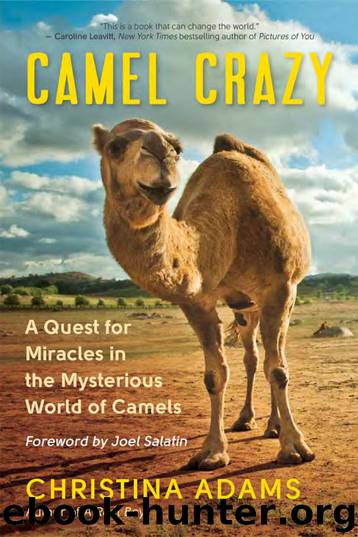Camel Crazy by Christina Adams

Author:Christina Adams
Language: eng
Format: epub
ISBN: 9781608686490
Publisher: New World Library
Published: 2019-09-16T16:00:00+00:00
23THE MOST CAMEL-CRAZY COUNTRY IN THE WORLD
“Good luck with that.”
— FEMALE SOMALI HERDER
My body is slowly sweltering in a San Diego apartment, but mentally I’m in Somalia. Just two hours’ drive south of my Orange County home, it’s like a different country. This tall concrete apartment block resembles a desert dwelling. Balconies rise around the courtyard like a step-well shimmering with water. It’s home to my friend Abdi. In his early forties, he’s a tireless father, community activist, cabdriver, and home health aide. (Somalis keep the local home-nursing and taxi communities going.) Abdi, tall and gregarious, is always eager to talk and help his people. I met him through Gil Riegler when Abdi was looking for camel milk. Knowing of my interest in camels, he’s invited senior Somali community members to share their lore, but he’s not sure if the elders will show up.
Somalia is the most camel-centric culture in the world. Located on the Horn of Africa, to the east of Kenya and Ethiopia, it borders the Indian Ocean and the Gulf of Aden. Its name is thought to come from a combination of soo and maal, meaning “go” and “milk,” the very essence of nomadic pastoralism. Somali social structure and lifestyles are so predicated on camels that they are rumored to have nearly fifty words for the ruminant they love. There’s even an official state camel named Maandeeq (meaning “milk-rich she-camel”), a lovely animal daubed in the powder blue of the national flag. Business and personal transactions, community standing, common sayings, measures of wealth, their very ideas of survival reflect their camel ethos. After a lifetime with camels and large families in Somalia’s jungles and stony deserts, these elders are spending their later years among sidewalks and strip malls.
I step inside the three-bedroom apartment. A jumbled pile of shoes sits by the door. “Should I take mine off?” I ask.
“No worry, sister, just be comfortable,” he says. But I remove them. Abdi’s little girl toddles over, not sure what to make of me but not shy. His wife, Rahmo, sweeps in, wearing a colorful headscarf and floor-length dress, and says hello with a wide smile. It’s clear she’s in charge of her own life. She and Abdi make an affable, if harried, couple, trading off care of their four children between his multiple shifts at caregiving, driving, and advocacy work. She shows him the food she’s made, its thick steam rising from the slow cooker, and leaves again.
“Have a seat, sister,” says Abdi, pointing to one of the low burgundy and gold floral sofas. No paintings or art are displayed on the walls. The girl clambers up and curiously touches my crystal bead necklace, her round face adorable under shiny black ringlets. I play with her as we wait.
When I sat at a table under the hot summer sun at the Somali Festival two years ago, at Abdi’s invitation, I was ready to talk about autism. He wanted to bring awareness of the disorder to his people, as rates of autism among US Somalis are rising.
Download
This site does not store any files on its server. We only index and link to content provided by other sites. Please contact the content providers to delete copyright contents if any and email us, we'll remove relevant links or contents immediately.
Sapiens: A Brief History of Humankind by Yuval Noah Harari(14371)
The Tidewater Tales by John Barth(12653)
Mastermind: How to Think Like Sherlock Holmes by Maria Konnikova(7324)
Do No Harm Stories of Life, Death and Brain Surgery by Henry Marsh(6938)
The Thirst by Nesbo Jo(6932)
Why We Sleep: Unlocking the Power of Sleep and Dreams by Matthew Walker(6706)
Life 3.0: Being Human in the Age of Artificial Intelligence by Tegmark Max(5550)
Sapiens by Yuval Noah Harari(5366)
The Body: A Guide for Occupants by Bill Bryson(5082)
The Longevity Diet by Valter Longo(5058)
The Rules Do Not Apply by Ariel Levy(4957)
The Immortal Life of Henrietta Lacks by Rebecca Skloot(4581)
Animal Frequency by Melissa Alvarez(4463)
Why We Sleep by Matthew Walker(4435)
The Hacking of the American Mind by Robert H. Lustig(4375)
Yoga Anatomy by Kaminoff Leslie(4359)
All Creatures Great and Small by James Herriot(4311)
Double Down (Diary of a Wimpy Kid Book 11) by Jeff Kinney(4261)
Embedded Programming with Modern C++ Cookbook by Igor Viarheichyk(4173)
